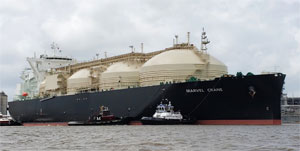After an outcry from the maritime industry, President Trump pledged not to waive Jones Act requirements in order to boost domestic shipments of liquefied natural gas (LNG).
In late April, petrochemical industry leaders lobbied for a waiver of the Jones Act to move LNG from U.S. production fields to Puerto Rico and the Northeast. The industry said there aren’t enough pipelines to move the product, and there currently are no LNG tankers that operate under the U.S. flag.
The Jones Act, enacted in 1920, requires that vessels carrying cargo between two U.S. ports be U.S.-built, U.S.-owned and U.S.-crewed.
After initially considering the proposal, Trump pledged on May 1 that he would not grant waivers for LNG tankers for Puerto Rico. Lawmakers from Alaska and the shipbuilding states of Mississippi and Louisiana defended the Jones Act at a White House meeting, apparently changing the president’s stance.
The governor of Puerto Rico sought a 10-year waiver to allow LNG to be delivered to the island on foreign-flagged vessels. Currently, the island imports most of its LNG from Trinidad. Puerto Rico produces more than 30 percent of its electricity from natural gas; the rest is generated from coal and oil, exacerbating air pollution on the island.
Supporters of the Jones Act waivers — including Harold Hamm, CEO of Continental Resources — say the exemptions would lower the cost of energy in Puerto Rico and ease the flow of domestic natural gas to the Northeast.
Jones Act supporters oppose the waivers because they could weaken the U.S. shipbuilding industry, reducing vessel manufacturing capability that is essential to national security and the country’s maritime presence. Industry experts calculate the cost of building an LNG tanker at a U.S. shipyard to be about $500 million, about three times the cost of construction at an Asian shipyard.
Worldwide, there are 478 dedicated LNG tankers. Crowley Maritime, a Jones Act carrier, ships LNG in tank containers from its Jacksonville, Fla., hub to pharmaceutical users in Puerto Rico.
Tom Allegretti, president and CEO of the American Waterways Operators, was one of the shipping industry leaders who supported Trump’s revised stance.
“(The use of waivers) undermines the Jones Act because it undermines confidence in America’s long-term commitment to its maritime industry and workforce,” Allegretti said in a prepared statement after the Oval Office meeting. “Maritime businesses rely on that commitment and stability to make long-term investments in new vessels, additional employees and expanded services for customers.”
In the wake of Hurricane Maria in 2017, the Jones Act was waived for 10 days to speed the delivery of relief supplies and fuel to storm-ravaged Puerto Rico. In the Northeast, Massachusetts Gov. Charlie Baker has discussed working with other New England governors to seek a waiver to allow shipments of LNG from domestic sources.
Matt Woodruff, president of the American Maritime Partnership, told a Senate commerce panel in March that there are no legal precedents for granting a Jones Act waiver on economic grounds such as lowering electricity prices.
Industry watchers estimate 11 additional LNG facilities will come online in the U.S. in the next five years, which has raised interest at U.S. shipyards about building ships to meet domestic demand.
Jones Act proponents say the goal of the act is to support national defense through a domestic shipbuilding industry and a merchant marine owned by U.S. citizens.
“A Jones Act waiver for any reason other than a national emergency is a bad deal for the United States,” retired Rear Adm. Thomas Shannon, former commander of the U.S. Navy Military Sealift Command, wrote in a Washington Times commentary in May.

